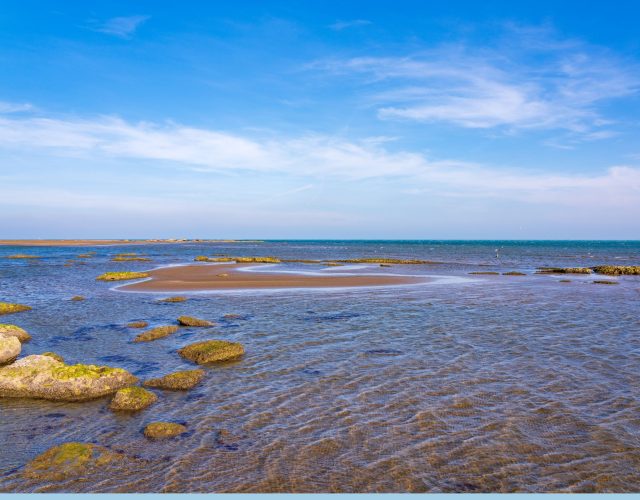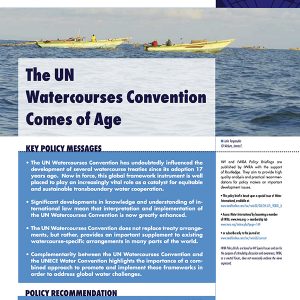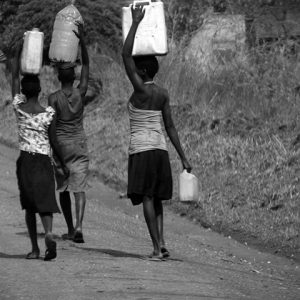The Nexus of Law and Water: Recent developments in the rights of nature and ecocide.
7 September

This IWRA Water Security Task force webinar on “The Nexus of Law and Water: Recent developments in the rights of nature and ecocide” was very popular, with over 250 people registered to discuss these recent changes.
John Knox started the presentation with an overview about the acceptance of the right to a healthy environment. He highlighted that while the right may not yet been recognized by the United Nations, but has been broadly adopted at the state level either by constitutional interpretation or by explicit mention through constitutional amendments or in legislation. These focus on procedural obligations (ie, decision making or remedies), substantive obligations, and the standards are to be applicable to all on a non-discriminatory, non-retrospective manner and are enforceable directly. A second key point is that the rights of the environment/ nature or specific elements (rivers for example) is being recognised by the courts around the world. In some of the jurisdictions such as India and Bangladesh, they are manifested as are upholding the rights same as legal rights of persons or as living beings themselves. Though there has been increasing acceptance of this analysis, this right is not nearly as widespread as an acceptance of a right to a healthy environment. A third view focused on the definition of ecocide, which has recently been proposed by the international non -governmental organisation further suggesting the inclusion of ecocide as the fifth crime in the Rome statute. The legal status of Ecocide, what it means and how far along are we from its inclusion along with the merits and demerits of such inclusion was discussed, which is still at the nascent stage.
Erin O’Donnell discussed the process and impact of when rivers acquire legal rights. She discussed the ways that courts around the world, including New Zealand, India, Columbia and others have recognized the rights of rivers and the ways that recognizing these rights can have positive impacts on humans and particularly indigenous communities, who depend on them. As she points out, the specific paths and implications which courts have used differs. This includes recognizing the river as a legal person or as a living being, with the latter creating a more dynamic relationship between humans and the river. As she highlighted, while the specific rivers may be acquiring legal rights, but these rights have not yet been taken up in the water law or environmental law frameworks at a broader level. Further clarifying that the right for rivers/nature depends widely on the human-nature interface driven by their relationship which is very different from the construction of the western rights-based approach, therefore, the interpretation of these rights requires caution and must be developed through respective context.
Shrishtee Bajpai presented about the broad crisis of rivers in India and the possibility of using these emerging rights to address these problems. These problems include those focused on the sustainability of the river itself, such as pollution and those of the people who are dependent on the river, such as equity concerns. While the recent Uttarakhand High Court (UHC) ruled that the Indian rivers Ganga and Yamuna had legal personhood, this ruling has been suspended by the India Supreme Court and faces a number of concerns about its implementation. She further discussed what it means by the stay from the Supreme Court and the possibility, as well as the grounds for the reopening of the case and what that might mean for the rights of rivers/nature. For example, the concept of a river is not defined for its regulation in Indian law much like in other jurisdictions. Also, these rights fail to fully focus on local cosmologies and beliefs. Echoing earlier panelists, a concern that these rights may not stop detrimental development on the river.
Mohammad Azaz presented on the urbanization of Dhaka and the ways that civil society have advocated for expanded legal rights for rivers in this area. Feeling that merely voicing their support was not enough, they sought to have the rights of the rivers better recognized by the courts. As this is put into implementation, this focus on issues such as needed to make sure that there is an appropriate guardian and that there is the right implementation and legislation. Also, registered disappointment for the non-holistic approach of the river management along with the lack of sufficient power granted to the guardian of the rivers and in the poor choice of such guardianship.
Guilherme Pratti considered the role of these rights in Brazil. He looked at the hydrological and climate crisis in the country. While they have significant water resources, the country is in a drought in part due to deforestation and mismanagement. He discussed the paradox where on one hand the country is willing to achieve more than half of its energy requirement through hydropower plants and on the other hand, mismanaged resources is resulting in habitat loss and loss of natural resources. Reflecting this, the climate change litigation is rising to protect the climate in Brazil. The courts have repeatedly upheld the rights of a healthy environment, they have not yet fully pushed the country to adopt the needed measures.
The panel discussed the ways that these rights have been a positive step forward. But, at the same time, there is a lack of a broader approach that would allow these rights to have a full and optimal impact.
The IWRA Water Security Task force webinar on “The Nexus of Law and Water: Recent developments in the rights of nature and ecocide” was well received. The event included; Prof. John H. Knox, Dr Erin O’Donnell, Shrishtee Bajpai, Mohammad Azaz, Guilherme Pratti, and Dr Amrisha Pandey.
Panellists
Dr. Erin O’Donnell – Fellow, University of Melbourne, Australia
Moderated by: Dr. Amrisha Pandey, Assistant Professor of Law, Gujarat Maritime University.
Click on the titles of the presentations below to access them:
IWRA Webinars constitute an additional resource designed to help our members, academics, dedicated practitioners, and policy professionals further explore these and other timely themes engaging in fruitful discussions, also aligned with the international water agenda and in close collaboration with key partners.


 .
. 





